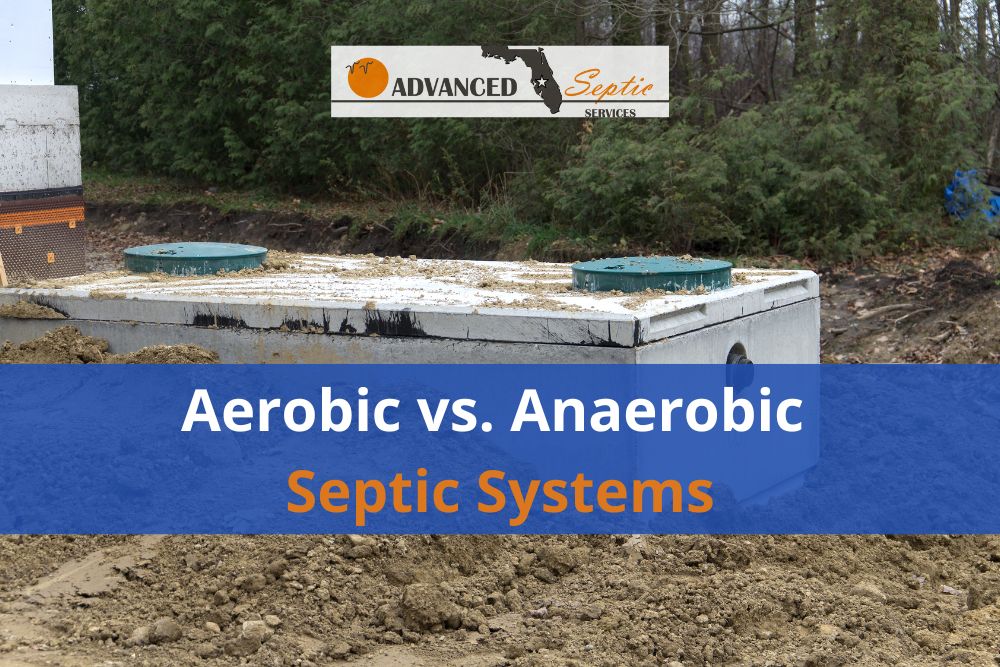
When managing wastewater in Central Florida, homeowners often face a critical choice: aerobic or anaerobic septic systems. Each system has advantages and disadvantages, making it essential to understand their differences to make an informed decision. Let’s explore the critical features of aerobic and anaerobic septic systems, focusing on their suitability for Central Florida’s unique environment.
Understanding Aerobic Septic Systems
Aerobic septic systems use oxygen to break down organic matter in wastewater. They typically consist of a tank that introduces air into the waste, promoting the growth of aerobic bacteria, which are highly efficient at decomposing organic material.
Advantages of Aerobic Septic Systems
Efficient Treatment: Aerobic systems provide a higher wastewater treatment level than anaerobic systems. This efficiency produces cleaner effluent, which is particularly beneficial in environmentally sensitive areas like Central Florida.
Reduced Odor: Since aerobic bacteria are more effective at breaking down waste, there is generally less odor associated with aerobic septic systems. This can be a significant advantage for homeowners concerned about unpleasant smells.
Versatility: Aerobic systems can be used in areas with high water tables or porous soil conditions, which are common in Central Florida. They can also handle higher volumes of wastewater, making them suitable for larger households.
Environmental Benefits: The cleaner effluent produced by aerobic systems can be safely released into the groundwater without concern for those with smaller drain fields and high water tables.
Disadvantages of Aerobic Septic Systems
Power Dependency: Aerobic systems rely on electricity to function, which can be a drawback in areas prone to power outages. Homeowners may need to invest in backup power solutions to ensure continuous operation.
Complexity: These systems are more complex, requiring regular inspection and maintenance to ensure they operate efficiently.
Reduced Resiliency: Septic systems utilize bacteria to break down waste. The bacteria found in aerobic systems require plenty of oxygen and don’t survive easily in high heat or environmental changes. For that reason, many Florida homeowners opt for anaerobic systems.
Understanding Anaerobic Septic Systems
Anaerobic septic systems operate without oxygen, using anaerobic bacteria to break down organic matter. These systems typically consist of a septic tank where waste is separated into solids and liquids, with the solids decomposing anaerobically.
Advantages of Anaerobic Septic Systems:
Lower Costs: Anaerobic septic systems are typically less expensive to install and maintain than aerobic systems. This cost-effectiveness makes them a popular choice for many homeowners in Central Florida.
Simplicity: These systems are simpler in design and operation, requiring less maintenance and fewer inspections. This simplicity can result in lower long-term maintenance costs and less hassle for homeowners.
Independence from Power: Anaerobic systems do not rely on electricity, making them ideal for areas with an unreliable power supply, areas prone to severe weather, or homeowners looking to reduce their energy consumption.
Resiliency: Looking for a system that can handle the heat and change in weather? That’s anaerobic systems and their bacteria. The naturally occurring bacteria requires less oxygen and can adapt better to their environment.
Disadvantages of Anaerobic Septic Systems
Less Efficient Treatment: Anaerobic systems are less efficient at treating wastewater, resulting in effluent that may not be as clean as that produced by aerobic systems. A local septic professional can help address this important consideration when designing your system and drain field.
Potential for Odors: The anaerobic decomposition process can produce unpleasant odors, which can be a drawback for homeowners and their neighbors. However, a well-maintained and healthy system is less prone to odors.
Soil and Water Table Sensitivity: Anaerobic systems are less adaptable to high water tables and poor soil conditions, common in many parts of Central Florida. This limitation leads to some needed adaptions.
Aerobic vs. Anaerobic: Which Is Right for You?
When choosing between aerobic and anaerobic septic systems, Central Florida homeowners must consider several factors. Both systems have advantages and disadvantages, making the decision unique to each home and household. Some of those factors include:
– Environmental Impact
– Cost
– Maintenance
– Site Conditions and Landscaping

